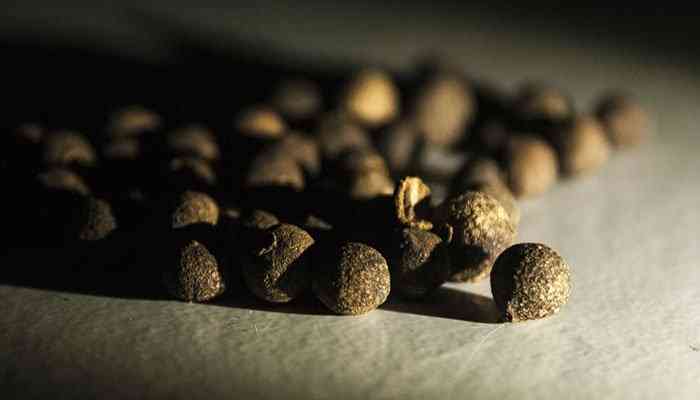Allspice: A Super Healthy Spice!
By Krista DeKuyper | November 1, 2017 |

Welcome to this 7th edition of our “Healthy Spices” series. Today we are going to look at allspice, a spice that originates from Central and South America and tastes a little like cinnamon, nutmeg and cloves all combined.
Similar to the other spices we’ve discussed, allspice is very healthy for us and also has numerous medicinal properties such as being an anti-inflammatory, digestion aid and immunity booster. According to recently published studies it also has anti-tumor and anti-cancer properties!
What is Allspice?
Allspice is the dried berries of an evergreen tree called Pimenta dioica, a member of the pimento family. Berries are picked before they are ripe and are sun-dried, at which point they can be ground up or used as a source for essential oils.
Allspice is also called “Jamaican allspice”, “Jamaican pepper” or “pimento”. It is widely used all over the world, but is especially popular in the Caribbean. (As an interesting side note, allspice is referred to as pimento because it was originally mistaken for black pepper).
Jamaica is the biggest exporter of allspice worldwide, and this spice is also a key ingredient in Jamaica’s famous beef patties and “jerked” seasoning that is used for pork and other dishes.
Historical Use of Allspice
The earliest recorded use of allspice is reportedly by the ancient Mayans and other South American natives, who used it as an embalming preservative as well as a flavouring ingredient when making chocolate.
Arawak natives (the original Jamaican inhabitants) often cured and preserved meat using allspice, with the end product being called “boucan”. European traders who cured meat in the same way became known as boucaniers, which eventually morphed into “buccaneers” (we will assume the pirates who habituated those waters liked their boucan)!
Christopher Columbus discovered allspice while on the island of Jamaica during his second voyage to the West Indies and took some back to Europe with him. There were several attempts to transplant allspice in various eastern growing regions, but this met with little success.
Eventually allspice was shipped back to England on a regular basis in the 1700s. However, allspice never caught on in Europe to the same degree that pepper, cinnamon or some other spices did. It was popular in England, however, where it was often referred to as “English Spice”.
Jamaica is the main exporter of allspice today, although several other countries such as Honduras and Guatemala also export it for sale (some consider the Jamaican allspice to be superior in quality compared to that grown by other countries).
Nutritional Properties of Allspice
Allspice contains high amounts of vitamin C along with significant amounts of vitamin A, niacin, thiamin and vitamin B6.
Allspice is also packed with large amounts of many essential minerals. It has very high amounts of manganese, as well as significant levels of potassium, phosphorus, magnesium, iron, copper and calcium.
For full detailed nutritional information please see the NutritionValue.org website.
Medicinal Properties of Allspice
The following are just some of the medicinal properties and health benefits of allspice:
Anesthetic and Antiseptic Properties
Allspice essential oil contains high amounts of eugenol. This phenylpropene has anesthetic properties, and has been used in dentistry as a local anesthetic and antiseptic for the gums and teeth1.
Eugenol is also a key ingredient in commercial toothache remedies (e.g. Numzident and Benzodent).
Anti-Inflammatory Properties
Eugenol has also been found to be a potent anti-inflammatory, thereby helping to reduce swelling and discomfort caused by inflammation.
Inflammation is a part of our immune system, and is the body’s response to harmful pathogens, cellular damage and other irritants.
Having said that, sometimes a reduction of inflammation can bring us pain relief, as is the case with arthritis!
Anti-Oxidant Properties and Aging
Allspice contains high amounts of antioxidants such as copper, polyphenols (e.g. eugenol and flavonoids such as quercetin) and manganese.
Anti-oxidants protect our cells from the ravages of free radicals, which have been linked to excessive aging, cancer, heart disease and other health problems.
Cancer Prevention and Potential Treatment
Recent studies2 have found that the eugenol and gallic acid found in allspice have anti-tumor properties on human and animal cancer cells.
In addition, Ericifolin (made from an aqueous allspice extract) also exhibits strong anti-prostate cancer and anti-breast cancer properties3.
In fact, the authors of the peer-reviewed, published medical study that is quoted above stated in their report: “Considering its purity, mostly available as ‘organically grown’ berries, availability at low cost, wide acceptance in culinary delights of many cultures world-wide, Allspice may have an additional space in most households, in their medicine cabinets.”!
Better Digestive Health
The eugenol in allspice has been proven to help alleviate digestive problems such as diarrhea, constipation and nausea4.
It also promotes regular bowel movements, thereby providing relief with excessive bloating and flatulence.
Muscle and Joint Pain Relief
Allspice has been used as a topical ointment for the treatment of sore muscles and joints for many centuries now.
In addition, the oils in allspice are also anti-inflammatory, which helps to reduce the swelling of joints.
Good for Type II Diabetics
Allspice has a very low Glycemic index, making it safe for consumption by Type II diabetics.
Drinking allspice tea just before eating may also help to control the blood sugar level of diabetics.
Cooking with Allspice
Allspice has a very strong, distinctive flavour. It has a bit of a peppery taste to it, yet it is sweet as well.
It is primarily allspice that gives Jamaica’s world famous jerked seasoning its flavour.
Allspice is commonly used in soups, stews, vegetable dishes, and is especially popular in desserts such as mincemeat and eggnog.
It is also commonly found in spice mixtures.
For some great allspice recipe ideas see the Spruce website.
Cautionary Notes
The following are some cautionary notes when ingesting large amounts of allspice (especially when taking it as an essential oil, which greatly magnifies its properties):
- It is possible for allspice to cause a skin reaction in some people when applied topically.
- The eugenol in allspice may reduce blood clotting. Some recommend that you stop taking it (in significant amounts) 2 weeks before a surgery5.
Conclusion
We hope you found this article on allspice helpful and interesting.
Super spices like allspice can add flavor to the food we eat and make it healthier at the same time!






























